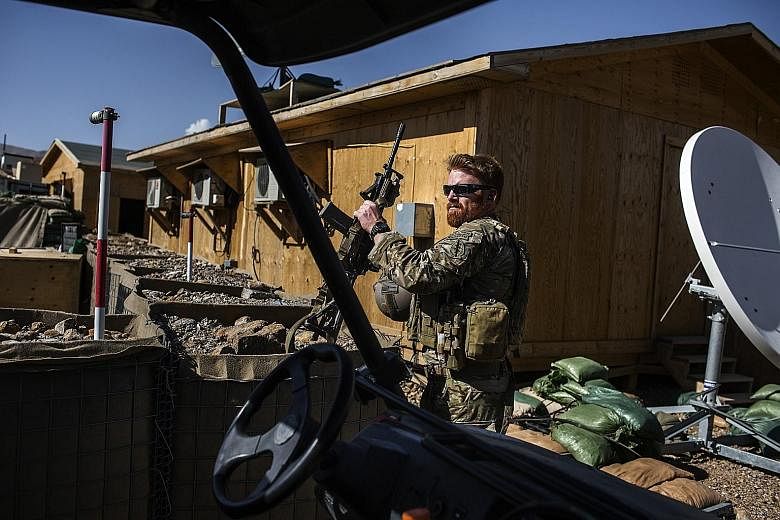WASHINGTON • They are taking on a larger combat role in Afghanistan, where the war is supposed to be over. They are headed to Syria to help fight the Islamic State in Iraq and Syria in its stronghold. And President Barack Obama recently ordered nearly 300 of them to Cameroon to assist African troops in their battle against a militant group that has pledged loyalty to ISIS.
Even as Mr Obama repeatedly said he opposes American "boots on the ground" in far-flung parts of the world, the White House has steadily expanded the global missions of US Special Operations troops - with US officials often resorting to linguistic contortions to mask the forces' combat role.
These deployments, as well as other missions being considered, have upended the Obama administration's goal of withdrawing from countries that for more than a decade have been crucibles of combat for the US military.
The White House is now considering a Pentagon proposal to maintain at least one base in Afghanistan for years to come, according to US military officials. This plan would run counter to Mr Obama's original pledge to remove all troops from Afghanistan except for a counterterrorism force and the troops guarding the US Embassy in Kabul. Mr Obama revised his withdrawal plans in October, saying about 5,500 troops would remain in the country until the end of his term in early 2017.
The proposal would use that Afghanistan base as a hub for Special Operations troops and intelligence operatives throughout Central and South Asia, part of a larger network of bases the Pentagon is envisioning in part to tackle ISIS and its over half-dozen affiliates in countries like Libya, Egypt and Yemen.
During the peak of the wars in Iraq and Afghanistan, nearly 13,000 Special Operations forces were deployed on missions across the globe, but a big majority was assigned to the two countries. Now about half of the 7,500 elite troops abroad are posted outside the Middle East or South Asia, operating in 85 countries, according to the US Special Operations Command.
There is other, subtler, evidence of the sway of senior Special Operations officers. When Mr Obama appeared before reporters in the Pentagon briefing room this month to discuss his administration's strategy for fighting ISIS in Syria, he was flanked by a coterie of top national security officials including Vice-President Joe Biden, Defence Secretary Ash Carter and General Joseph F. Dunford Jr, chairman of the Joint Chiefs of Staff. Standing beside them was General Joseph L. Votel, head of the US Special Operations Command, whose presence raised eyebrows at the Pentagon.
The threat from ISIS has become more prominent in the presidential campaign since the attacks in Paris and San Bernardino, California, and many candidates have proclaimed a need for more Special Operations troops to be deployed far and wide.
These calls for more US Special Operations troops have come even as some of the same candidates said they opposed boots on the ground in places such as Syria.
Mr Obama himself tried to draw a distinction during an interview this month with CBS News, when a reporter asked if recent Special Operations deployments in Iraq and Syria meant he was reversing his pledge. "You know, when I said 'No boots on the ground', I think the American people understood generally that we're not going to do an Iraq-style invasion of Iraq or Syria with battalions that are moving across the desert," he said.
Senior US officials disagree on what exactly these troops will be doing, with top aides to Mr Obama playing down any fighting role. "This is not a combat mission," one senior administration official said, speaking on the condition of anonymity to discuss internal directives to the Pentagon. "This is to enable partners."
But in a conference call with reporters on Dec 2, Colonel Steven H. Warren, a military spokesman in Baghdad, said: "I mean, a raid is a combat operation. There is no way around that. So, yeah, more Americans will be coming here to Iraq, and some of them will be conducting raids inside of both Iraq and Syria."
NEW YORK TIMES

